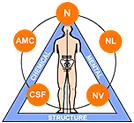


Immune System

Immune System Function
The Immune System has several components which will be summarized below. To learn more follow this link to Khan Academy's website and review the
8 lessons. Number 7 lesson is an excellent summary if you have limited time.
Usually about the third or forth visit I will begin the process of optimizing the Core Immune System which is the key to Neural Organization Work (N.O.W.) to train the immune system to go back and fight and win the battles that are responsible for the present illness /condition.
The initial defenses of the Immune system also called the non-specific immune system is the obvious first line barriers of skin, mucous membranes, stomach acid etc., the second tier reactions, once a foreign microbe enters the body, white blood cells (leukocytes) migrate to site of infection triggering an inflammatory reaction. Dr. Corwin will reference this as the superficial Immune System (S.I.S.). This S.I.S. is generally addressed (optimized) the first or second visit. On all follow up visits the S.I.S is checked and often my first hint one has had a recent cold / flu since one's last visit.
On future visits, and especially if dealing with a chronic illness, next is optimizing the core immune which I may reference as [spleen - thymus - central nervous system - macrophage - B lymphocytes - T lymphocytes].
Except for the B & T lymphocytes, these components are essentially your leukocytes and still part of the nonspecific immune system, (routinely monitored on blood work lab tests).
The B & T Lymphocytes are classified as the Specific or Adaptive Immune System and the key to chronic illnesses. Aberrations or deficiencies in these components are the first clinical signs hinting there is a chronic microbial infiltration is the body tissues such as {herpes simplex, heavy metal toxicity, lyme disease, herpetic viral illnesses such as CFS, FM, etc. and of course auto-immune conditions and cancer}.
To really understand the roles of B & T Lymphocytes, please study the lectures on the Khan Academy website list above and then one will be ready to apply for a job as a immunology assistant! :-)
Briefly summarizing; B lymphocytes come from and mature in the bone marrow and specific identify and tag foreign invaders in the humeral body fluids ...thus called the Humeral Response. Antibody production is a key role of B lymphocytes.
Where as T lymphocytes mature in the Thymus, they specific identify and tag cells that have been infiltrated and or taken over by foreign invaders and thus called the Cell-Mediated Response. Once these T lymphocytes are programmed to find the invaders, they make quick work in destroying the contaminated cell(s). T-helper cells, another kind of T lymphocyte also up-regulate B cells and both are capable of memory thus creating ones Immunity to a future similar microbial attack.
Cancer cells are a different story in that our cells have not been randomly attacked by bacterium and or simple viruses but infiltrated by DNA strands from smart viruses /viral components natural or man-made which have altered the cellular nucleus altering the DNA strands and cellular operations. Certainly environmental contaminants especially radiation can do the same.
Once the nucleus has been taken over by the altered DNA material, the cell(s) simply run amuck, with protein production transcribed from from the DNA and reproduction capacity essentially taken over / kidnapped into reproducing in a disorderly and undifferentiated fashion. Still being self, the B & T Lymphocytes have trouble recognizing it as initially abnormal cell(s). Only until the cells accumulate in a large enough community does it often trigger an immune response. Cancer cells, of varying degrees, also have a tendency to not stick to each other thus migrate or metastasize.
It takes a well optimized core immune system with programmed knowledge to keep cancer cells under control and fight and win the battles against toxicities and microbes that it has lost or retreated from in the past. That is my mission.
(the top eight foods)
(Why is it always involved)
Food Sensitivities / Allergies
Although the two terms are often interchanged, food sensitivities one generally acquires and true allergies one has a genetic predisposition and thus born with. How sensitivities develop is open to question however I am of the opinion that it often develops from digestive issues /inflammation of the small & large intestines. Common causes include candida, herpetiuc viruses, etc. and anything that compromises the inner lining of the intestines often called leaky gut syndrome. Potential other causes can be excessive consumption of the same food and introduction of table food too early in infant years.
The big eight food sensitivities often listed are:
- Milk
- Wheat
- Eggs
- Peanuts
- Fish
- Crustaceans,
- Tree nuts
- Soy Beans
(comprehensive list)

